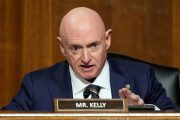On April 3, Kentucky Governor Andy Beshear, a Democrat, issued a message stating that he was vetoing Senate Bill 2, which clarified Kentucky’s requirements requiring proof of identification in order to vote. Contrary to Beshear’s assertion that this legislation would “create an obstacle to the ability of Kentuckians to exercise their right to vote,” SB 2 provided generous accommodations for voters to cast a provisional ballot if they are unable to produce proof of identification.
Voters who had difficulty in obtaining the necessary identification documents are asked, under the proposed legislation, to appear before the county clerk or county board of elections to provide an affidavit stating that the voter is the same individual who cast the provisional ballot or provisional absentee ballot, and to either show proof of identification or give a sworn statement as to the reasonable impediment that precluded the voter from obtaining proof of identification.
The bill would provide for the voter to cast a provisional absentee ballot if the voter did not submit proof of identification.
Beshear claimed that “the provisions of Senate Bill 2 would also likely threaten the health and safety of Kentuckians by requiring them to obtain identification during the novel coronavirus (COVID-19) pandemic, a public health emergency. During this time, the offices that would provide this identification are not open to in-person traffic, which would be necessary to create the actual identification.”
Because of the social isolation requirements imposed as a response to the pandemic, Kentucky has postponed its primary election, originally scheduled for May 19, to June 23.
However, should the legislation ultimately be passed by overriding the governor’s veto, voters would only be required to present government ID starting with the general election on November 3.
The offices that would provide the required identification to voters most certainly will be open before November.
Beshear’s veto could easily be overridden, since the bill was passed by supermajorities in both chambers of the state legislature. Twenty-nine of the 38 senators are Republicans, as are 61 of the 100 representatives.
“I ask the legislators of both parties who believe in election integrity and passed this law to override this regrettable veto, and I hope the governor will eventually join me in governing from the center,” Secretary of State Michael Adams, a Republican, said in a statement.
The New American has publish multiple articles on the subject of voter fraud in recent years, indicating that this is a real, not just a theoretical, problem. In one such article in 2018 we observed:
American election safeguards have experienced erosion in such areas as reducing or eliminating public access to witness the process, voter registration lists being inaccurate, same-day voter registration, lack of a paper trail in the ballots, elimination of precincts in favor of voting by mail, early voting, not making precinct-level election results public immediately, and not counting the absentee ballots in public at the proper precinct.
We noted in a 2016 article that an organization called VoteFraud.org had issued a statement that it has uncovered evidence of more than three million people who are not U.S. citizens casting votes in the 2016 presidential election. We also cited a 2014 study that found that enough non-citizens were casting ballots to influence close races. It’s no surprise, we noted, that Democrats have steadfastly opposed voter-ID measures, either (even though identification is required for most everything else, from receiving government benefits to visiting the White House). Seventy to ninety percent of legal immigrants vote Democrat upon naturalization, and the figure for illegal migrants is at the upper end of that range.
Another article in The New American in 2017 quoted an announcement from Ohio Secretary of State Jon Husted, who said, “an investigation has uncovered that hundreds of non-US citizens are registered to vote in the state, and dozens of them voted illegally.” NBC News-Columbus reported, “According to a release from Husted, 385 people who are not citizens of the United States are registered to vote in Ohio. Out of those, 82 voted in at least one election in the last year.”
“I have a responsibility to preserve the integrity of Ohio’s elections system,” Husted said. “When you consider that in Ohio we have had 112 elections decided by one vote or tied in the last three years, every case of illegal voting must be taken seriously, and elections officials must have every resource available to them to respond accordingly.”
Confirming the identity of voters by requiring them to present proper identification is an important first step in ensuring the integrity of elections. Members of Kentucky’s legislature who recognize this still have the option of overturning Governor Beshear’s veto.
Photo: AP Images
Warren Mass has served The New American since its launch in 1985 in several capacities, including marketing, editing, and writing. Since retiring from the staff several years ago, he has been a regular contributor to the magazine. Warren writes from Texas and can be reached at [email protected].
Related articles:
Obama Administration Wants to Ensure Illegals Can Vote in November Election
Voter Fraud: Manipulating the Vote
Ohio Investigation Reveals Voter Fraud
1,100 Vote Fraud Cases Forgotten While Florida Counts Ballots
Vote Fraud Monitoring Group Says Three Million Noncitizens Voted in Presidential Election




